Accelerating education: UVA students earn Bachelors and Masters in four years with 3+1 program
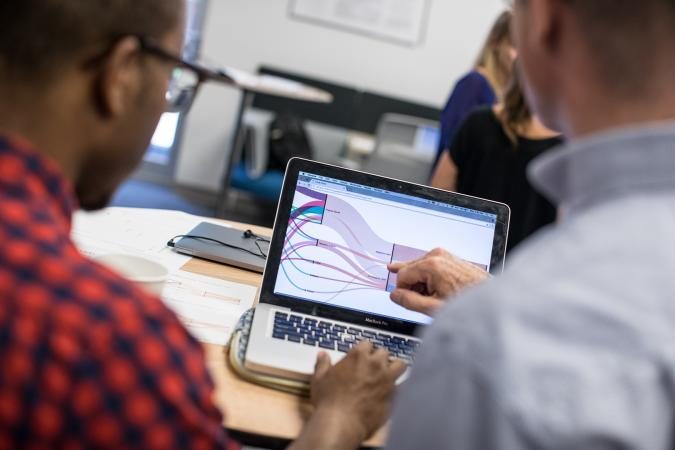
There are 42 students in the MSDS class of 2020. Within this small cohort, there are students returning from several years in the working world and career professionals who decided they want a better understanding of the growing field of data science.
There are also students who finished their undergraduate studies at the University of Virginia in just three years, or four, and decide to stay one more year to graduate with a Master’s degree in Data Science.
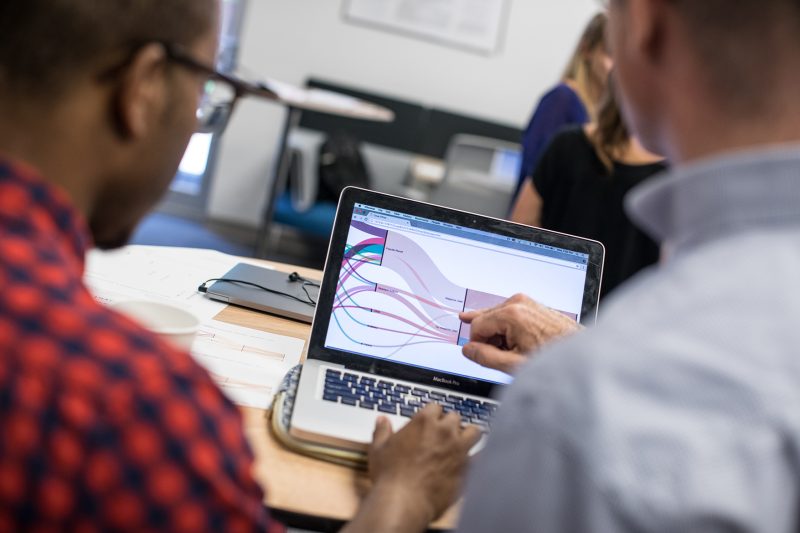
“The professional Master of Science in Data Science degree allows a UVA undergraduate to dramatically change the trajectory of their career path by providing a highly technical skill set, and it only takes 11 months to complete,” said Patti Edson, the Associate Director of Admissions & Financial Aid.
Some of these individuals choose an accelerated path, finishing their undergraduate degree in three years and getting their MSDS in one. Others decide to apply during their fourth year of undergraduate study, making it five years total.
These 3+1 and 4+1 degree options allow students to graduate from UVA with an undergraduate and masters degree in a short amount of time and offer several other benefits to students.
“The MSDS program provides real-world experience. Over the course of the entire program, students work on a capstone project on behalf of a real client with real data, solving real world problems,” Edson explained. “The program is collaborative and experiential and prepares them for a job-market demanding these exact skills.”
There are many wahoos who choose this path and come from a variety of undergraduate backgrounds.
Nick Clifford entered the School of Data Science immediately after graduating with his undergraduate degree in Astronomy/Astrophysics in May of 2019.
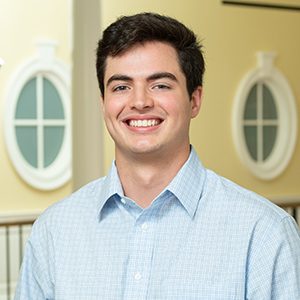
“I first heard about Data Science my 3rd year from an Astronomy teaching assistant who, after his first year as a graduate student, decided to reapply to a data science program at a different school,” Clifford explained. “I hadn't really any notion of what data science was at that time, but he told us how he had friends from his undergraduate astronomy class now working as data scientists at places like Spotify and Google, which I think really had an impact on my thoughts for the future.”
As fourth year approached, Clifford began to think about his major and his hopes for the future. After hearing about data science from his TA, he began to seriously consider MSDS programs and schools that offered this degree.
“I felt like the past four years of classes had taught me so much while at the same isolated me in a world solely comprised of all things astrophysics and academia,” Clifford said. “A friend mentioned the program at UVA and I just kinda thought it'd be the perfect choice. I could keep developing the skills that I learned all throughout undergrad, apply them to the world in real time, and I could do it without having to move all my stuff from my apartment.”
Clifford quickly learned that data science provides a wealth of opportunities for future careers. He said that the sky is really the limit when it comes to possible careers, as so many companies are interested in hiring data scientists.
Bradley Katcher, MSDS class of 2020 and President of the MSDS Student Council, has a particularly unique path to getting his MSDS.
He completed his undergraduate major in economics in two years and graduated from the Frank Batten School of Leadership and Public Policy with his Masters in Public Policy (MPP) by the end of his third year. He will graduate with his Masters in Data Science in May of 2020, becoming a Triple Hoo.
“I think data is becoming increasingly the most valuable asset in the world, and so that getting a better understanding of how, as a policymaker, as an economist, as a professional, to work with data and use cutting edge tools to do so is going to be super valuable,” Katcher said, explaining his interest in data science.
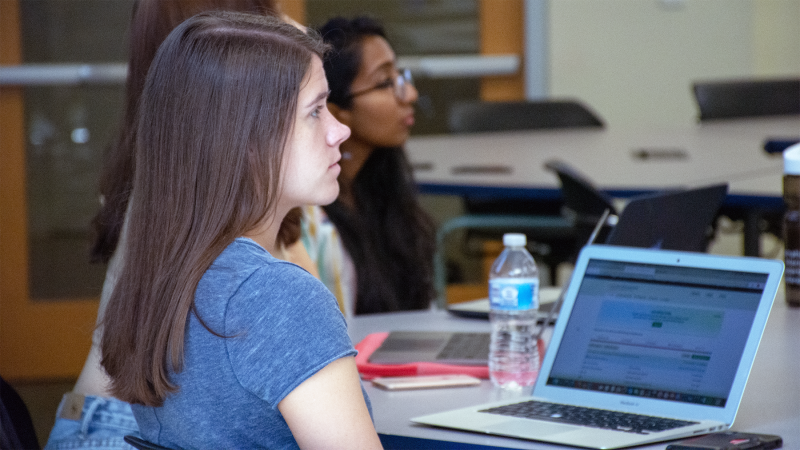
For Elizabeth Driskell, who finished her biology degree in three years, getting her MSDS during her fourth year while looking towards a future in medicine was the perfect option for multiple reasons.
“It was appealing to get my masters in 1 year so that I could stay in Charlottesville for my fourth year,” Driskell said. “I also think one year is the perfect length to be able to get a general overview of many concepts in data science (first semester) and then be able to dive deeper into specific topics that you find interesting with electives during the second semester.”
In addition to the benefits of getting her masters in one year, Driskell chose this path to be able to best serve her patients in the future.
“I wanted to focus on a different subject than biology after graduating, and I think there are so many opportunities to use data science in the real world,” Driskell explained. “Specifically, with the vast amount of healthcare data available, I wanted to learn how to extract valuable information from this data to ultimately improve patient care and quality of life.”
Driskell recently got accepted into UVA’s School of Medicine, where she plans to continue to put her data science skills to work in clinical research.
“As healthcare data continues to grow, I hope to use my skills to manage the many changes and considerations that come along with this,” Driskell said.
These 3+1 and 4+1 tracks are becoming increasingly popular paths of study among students at UVA. Katcher noted that the advantages of completing the MSDS degree are two-fold. One advantage is the personal investment.
“In an increasingly competitive world, coming out with a Masters degree will make you much more marketable, and you’ll start with a higher salary to begin with,” Katcher said. “There are just some advantages there in terms of investing in yourself.”
Katcher described another advantage of the MSDS program as a 3+1 or 4+1 track: getting exposed to graduate work.
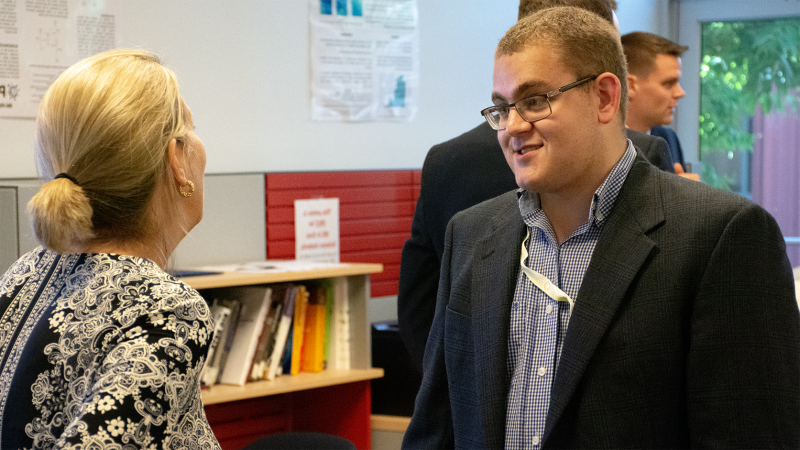
“It’s very different from undergrad. There are a lot of MSDS students who come in as professionals and you get the chance to learn from them,” Katcher said. “We have someone in our program who is a trained doctor. We have someone from a math background, a whole bunch of different perspectives so just being able to learn and get their perspective on issues is incredibly valuable for me.”
Katcher also added that getting this technical degree supplemented his liberal arts degree well. While he is doing more problem sets and quantitative analysis in this program, he still uses his liberal arts background, especially in a class called “Ethics of Big Data.”
“We’re learning about some of the most pressing issues in ethics, discussing philosophical approaches to data management and open data,” Katcher explained. “So you are not losing that [liberal arts perspective]. It’s supplementing it in a really valuable way.”
In addition to gaining technical skills and having hands-on experience with real data sets, the School of Data Science Career Services offers assistance in the job search process, interview process, and even hosts treks to major cities to meet with company executives across industries, such as New York.
The 3+1 and 4+1 tracks offer a unique opportunity for students to get their masters in 11 months, have access to pre-professional experience, and combine their undergraduate degrees, whether in English or Math, with a technical Data Science degree.